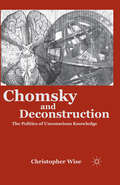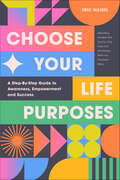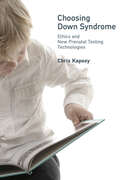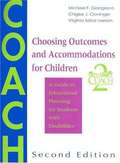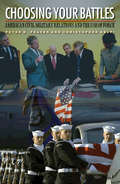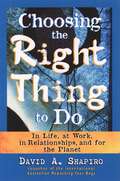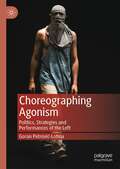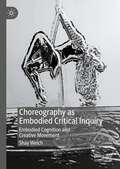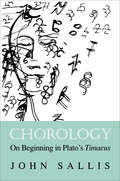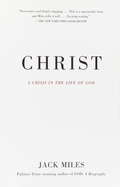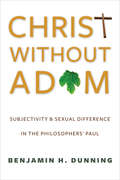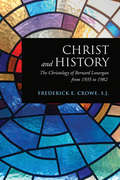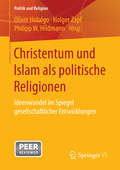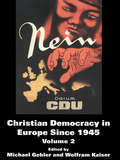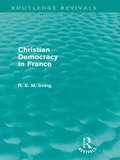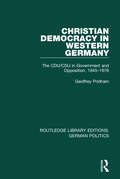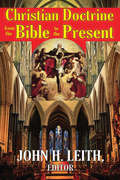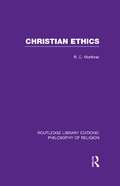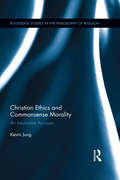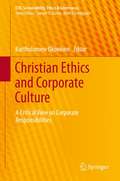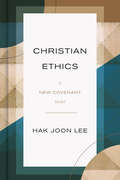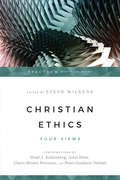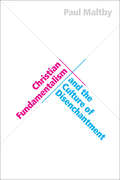- Table View
- List View
Chomsky and Deconstruction: The Politics of Unconscious Knowledge
by Christopher WiseThis book offers a careful and measured response to Noam Chomsky's criticism against deconstructive theories of language. The author reveals the connections between Chomsky's linguistic theories and politics by demonstrating their shared philosophical basis.
Choose Your Life Purposes: A Step-By-Step Guide to Awareness, Empowerment and Success
by Eric MaiselGo on a Journey Towards Personal Growth and Unlock Your Life&’s PurposeUnravel the myth of a singular life purpose ingrained in religious teachings and societal notions#1 New Release in Free Will & Determinism PhilosophyLiberate yourself from the "life purpose trap." Leading life coach, regular contributor to Psychology Today, and renowned author Eric Maisel presents a contemporary philosophy that challenges the conventional wisdom surrounding how to live. Discover the transformative philosophy of Choose Your Life Purposes. Explore the step-by-step process to identify your core values, unlocking what truly matters to you. This groundbreaking book empowers you to embrace multiple life purposes, fostering personal growth and awareness. No longer confined to endless seeking, you'll learn to live life now, irrespective of circumstances. How to live your best life. Explore the art of crafting life purpose statements, mantras, and icons to reinforce your choices. Make living with purpose a daily practice, transforming your life into a purpose-filled journey. Say goodbye to fruitless searches for meaning and embark on a personal growth revolution. Inside: Learn how to develop your personal values list Create a personal roadmap for a fulfilling and purposeful existence Have a guide at your fingertips on how to live with purpose daily Learn how to handle existential crises Acquire new tools to heal depression, anxiety, and addiction If you liked From Strength to Strength, How to Ikigai, or Creating a Life That Matters, you&’ll love Choose Your Life Purposes.
Choosing Down Syndrome: Ethics and New Prenatal Testing Technologies (Basic Bioethics)
by Chris KaposyAn argument that more people should have children with Down syndrome, written from a pro-choice, disability-positive perspective.The rate at which parents choose to terminate a pregnancy when prenatal tests indicate that the fetus has Down syndrome is between 60 and 90 percent. In Choosing Down Syndrome, Chris Kaposy offers a carefully reasoned ethical argument in favor of choosing to have such a child. Arguing from a pro-choice, disability-positive perspective, Kaposy makes the case that there is a common social bias against cognitive disability that influences decisions about prenatal testing and terminating pregnancies, and that more people should resist this bias by having children with Down syndrome.Drawing on accounts by parents of children with Down syndrome, and arguing for their objectivity, Kaposy finds that these parents see themselves and their families as having benefitted from having a child with Down syndrome. To counter those who might characterize these accounts as based on self-deception or expressing adaptive preference, Kaposy cites supporting evidence, including divorce rates and observational studies showing that families including children with Down syndrome typically function well. Himself the father of a child with Down syndrome, Kaposy argues that cognitive disability associated with Down syndrome does not lead to diminished well-being. He argues further that parental expectations are influenced by neoliberal ideologies that unduly focus on the supposed diminished economic potential of a person with Down syndrome.Kaposy does not advocate restricting access to abortion or prenatal testing for Down syndrome, and he does not argue that it is ethically mandatory in all cases to give birth to a child with Down syndrome. People should be free to make important decisions based on their values. Kaposy's argument shows that it may be consistent with their values to welcome a child with Down syndrome into the family.
Choosing Outcomes and Accommodations for Children: A Guide to Educational Planning for Students with Disabilities (2nd edition)
by Michael F. Giangreco Chigee J. Cloninger Virginia S. IversonRevised in response to research and user feedback, COACH offers you redesigned forms, more explicit instructions, and helpful hints, and tabs and icons so you can easily locate information.
Choosing Your Battles: American Civil-Military Relations and the Use of Force
by Peter D. Feaver Christopher GelpiAmerica's debate over whether and how to invade Iraq clustered into civilian versus military camps. Top military officials appeared reluctant to use force, the most hawkish voices in government were civilians who had not served in uniform, and everyone was worried that the American public would not tolerate casualties in war. This book shows that this civilian-military argument--which has characterized earlier debates over Bosnia, Somalia, and Kosovo--is typical, not exceptional. Indeed, the underlying pattern has shaped U.S. foreign policy at least since 1816. The new afterword by Peter Feaver and Christopher Gelpi traces these themes through the first two years of the current Iraq war, showing how civil-military debates and concerns about sensitivity to casualties continue to shape American foreign policy in profound ways.
Choosing the Right Thing to Do: In Life, at Work, in Relationships, and for the Planet
by David A. ShapiroWe all want to do the right thing. But determining the right thing to do isn't always easy. Everytime we pick up a newspaper or turn on the TV, someone tells us how we ought to behave. Rarely, however, do we get much assistance in deciding what to do for ourselves. Meanwhile, technological developments and rapid social changes make the right decisions-especially about the BIG issues-life, death, sex, justice, and so on-harder and harder to identify.Choosing the Right Thing to Do responds to the growing need that people of all ages have for moral guidance-without moralizing. It contains a rich palette of principles and strategies, stories and examples, ideas and insights that offer real-world help for intelligently addressing the often quite troubling choices we face every day in our personal relationships, jobs, and lifestyles.
Choreographing Agonism: Politics, Strategies and Performances of the Left
by Goran Petrović-LotinaIn Choreographing Agonism, author Goran Petrović Lotina offers new insight into the connections between politics and performance. Exploring the political and philosophical roots of a number of recent leftist civil movements, Petrović Lotina forcefully argues for a re-imagining of artistic performance as an instrument of democracy capable of contesting a dominant politics.Inspired by post-Marxist theories of discourse theory, hegemony, conflict, and pluralism, and using tension as a guiding philosophical, political, and artistic force, the book expands the politico-philosophical debate on theories of performance. It offers both scholars and practitioners of performance a thought-provoking analysis of the ways in which artistic performance can be viewed politically as ‘agonistic choreo-political practice,’ a powerful strategy for mobilising alternative ways of living together and invigorating democracy.Choreographing Agonism makes a bold and innovative contribution to the discussion of political and philosophical thought in the field of Performance Studies.
Choreographing Problems: Expressive Concepts in Contemporary Dance and Performance (Performance Philosophy)
by Bojana CvejićThis book illuminates the relationship between philosophy and experimental choreographic practice today in the works of leading European choreographers. A discussion of key issues in contemporary performance from the viewpoint of Deleuze, Spinoza and Bergson is accompanied by intricate analyses of seven groundbreaking dance performances.
Choreography as Embodied Critical Inquiry: Embodied Cognition and Creative Movement
by Shay WelchIn this book, Shay Welch expands on the contemporary cognitive thinking-in-movement framework, which has its roots in the work of Maxine Sheets-Johnstone but extends and develops within contemporary embodied cognition theory. Welch believes that dance can be used to ask questions, and this book offers a method of how critical inquiry can be embodied. First, she presents the theoretical underpinnings of what this process is and how it can work; second, she introduces the empirical method as a tool that can be used by movers for the purpose of doing embodied inquiry. Exploring the role of embodied cognition and embodied metaphors in mining the body for questions, Welch demonstrates how to utilize movement to explore embodied practices of knowing. She argues that our creative embodied movements facilitate our ability to bodily engage in critical analysis about the world.
Chorology: On Beginning in Plato's Timaeus (The\collected Writings Of John Sallis Ser. #I, 11)
by John Sallis“The major American philosopher . . . makes us want to re-read the Platonic text with fascination. And that is but its grandest gift.” —Daniel Guerriere, professor emeritus of philosophy at California State University, Long BeachIn Chorology, John Sallis takes up one of the most enigmatic discourses in the history of philosophy. Plato’s discourse on the chora—the chorology—forms the pivotal moment in the Timaeus. The implications of the chorology are momentous and communicate with many of the most decisive issues in contemporary philosophical discussions.“This excellent work . . . deserves the serious consideration of all who are interested in contemporary philosophy as well as those who concern themselves with ancient philosophy, especially Plato.” —Review of Metaphysics
Christ
by Jack MilesWith the same passionate scholarship and analytical audacity he brought to the character of God, Jack Miles now approaches the literary and theological enigma of Jesus. In so doing, he tells the story of a broken promise-God's ancient covenant with Israel-and of its strange, unlooked-for fulfillment. For, having abandoned his chosen people to an impending holocaust at the hands of their Roman conquerors. God, in the person of Jesus, chooses to die with them, in what is effectively an act of divine suicide. On the basis of this shocking argument, Miles compels us to reassess Christ's entire life and teaching: His proclivity for the powerless and disgraced. His refusal to discriminate between friends and enemies. His transformation of defeat into a victory that redeems not just Israel but the entire world. Combining a close reading of the Gospels with a range of reference that includes Donne, Nietzche, and Elie Wiesel, Christ: A Crisis in the Life of God is a work of magnificent eloquence and imagination. From the Trade Paperback edition.
Christ Without Adam
by Benjamin H. DunningThe apostle Paul deals extensively with gender, embodiment, and desire in his authentic letters, yet many of the contemporary philosophers interested in his work downplay these aspects of his thought. Christ Without Adam is the first book to examine the role of gender and sexuality in the turn to the apostle Paul in recent Continental philosophy. It builds a constructive proposal for embodied Christian theological anthropology in conversation with -- and in contrast to -- the "Paulinisms" of Stanislas Breton, Alain Badiou, and Slavoj ?i?ek.Paul's letters bequeathed a crucial anthropological aporia to the history of Christian thought, insofar as the apostle sought to situate embodied human beings typologically with reference to Adam and Christ, but failed to work out the place of sexual difference within this classification. As a result, the space between Adam and Christ has functioned historically as a conceptual and temporal interval in which Christian anthropology poses and re-poses theological dilemmas of embodied difference. This study follows the ways in which the appropriations of Paul by Breton, Badiou, and ?i?ek have either sidestepped or collapsed this interval, a crucial component in their articulations of a universal Pauline subject. As a result, sexual difference fails to materialize in their readings as a problem with any explicit force. Against these readings, Dunning asserts the importance of the Pauline Adam--Christ typology, not as a straightforward resource but as a witness to a certain necessary failure -- the failure of the Christian tradition to resolve embodied difference without remainder. This failure, he argues, is constructive in that it reveals the instability of sexual difference, both masculine and feminine, within an anthropological paradigm that claims to be universal yet is still predicated on male bodies.
Christ Without Adam: Subjectivity and Sexual Difference in the Philosophers' Paul (Gender, Theory, and Religion)
by Benjamin DunningThe apostle Paul deals extensively with gender, embodiment, and desire in his authentic letters, yet many of the contemporary philosophers interested in his work downplay these aspects of his thought. Christ Without Adam is the first book to examine the role of gender and sexuality in the turn to the apostle Paul in recent Continental philosophy. It builds a constructive proposal for embodied Christian theological anthropology in conversation with—and in contrast to—the "Paulinisms" of Stanislas Breton, Alain Badiou, and Slavoj i ek.Paul's letters bequeathed a crucial anthropological aporia to the history of Christian thought, insofar as the apostle sought to situate embodied human beings typologically with reference to Adam and Christ, but failed to work out the place of sexual difference within this classification. As a result, the space between Adam and Christ has functioned historically as a conceptual and temporal interval in which Christian anthropology poses and re-poses theological dilemmas of embodied difference. This study follows the ways in which the appropriations of Paul by Breton, Badiou, and i ek have either sidestepped or collapsed this interval, a crucial component in their articulations of a universal Pauline subject. As a result, sexual difference fails to materialize in their readings as a problem with any explicit force. Against these readings, Dunning asserts the importance of the Pauline Adam–Christ typology, not as a straightforward resource but as a witness to a certain necessary failure—the failure of the Christian tradition to resolve embodied difference without remainder. This failure, he argues, is constructive in that it reveals the instability of sexual difference, both masculine and feminine, within an anthropological paradigm that claims to be universal yet is still predicated on male bodies.
Christ and History
by Frederick E. Crowe, S.J.Because of illness and age the Jesuit theologian and philosopher Bernard Lonergan never completed the systematic study on Christology, the doctrine concerning the person of Christ, that he had planned to write. Christ and History, written by his former student Frederick E. Crowe, is an attempt to rectify that loss by tracing the outline of Lonergan's possible work on the subject.Moving from the Jesuit philosopher's early student work, through the fertile and productive years in which he wrote Insight and Method in Theology, to his final lectures on the topic, Crowe presents the evolution of Lonergan's thinking on Christology in the context of the radical developments contained within his other theological writings. Written in the spirit of piety towards his revered teacher, Christ and History is an important analysis of these works and the Christology that they contain.
Christentum und Islam als politische Religionen: Ideenwandel im Spiegel gesellschaftlicher Entwicklungen (Politik und Religion)
by Oliver Hidalgo Philipp W. Hildmann Holger ZapfDer Band untersucht wichtige Stationen des Wandels politisch-religi#65533;ser Ideen im Christentum und im Islam als ideelle Anpassungsleistungen an die sich stetig ver#65533;ndernden gesellschaftlichen Rahmenbedingungen bzw. auch als Gestaltungsversuche des Politischen auf Basis theologischer Pr#65533;missen. Damit leistet das Buch einen zentralen Beitrag zum Verst#65533;ndnis der genuin politischen Dimension von Religionen unabh#65533;ngig von beobachtbaren S#65533;kularisierungsprozessen und m#65533;glichen institutionellen Trennungen zwischen Staat und Kirche. Die versammelten Aufs#65533;tze loten konzeptionelle und methodische Zugangsm#65533;glichkeiten zum Themenfeld aus und erschlie#65533;en den politisch-religi#65533;sen Wandel in Christentum und Islam zum Teil in Einzelfallanalysen, zum Teil in vergleichender Perspektive.
Christian Democracy in Europe Since 1945: Volume 2
by Wolfram Kaiser Michael GehlerFor the first time, this book reveals the actual roles of the Christian Democratic (CD) parties in postwar Europe from a pan-European perspective. It shows how Christian Democratic parties became the dominant political force in postwar Western Europe, and how the European People's Party is currently the largest group in the European Parliament. CD parties and political leaders like Adenauer, Schuman and De Gasperi played a particularly important role in the evolution of the 'core Europe' of the EEC/EC after 1945. Key chapters address the same questions about the parties' membership and social organization; their economic and social policies; and their European and international policies during the Cold War. The book also includes two survey chapters setting out the international political context for CD parties and comparing their postwar development, and two chapters on their transnational party cooperation after 1945.This is the companion volume to Political Catholicism in Europe 1918-1945.
Christian Democracy in France (Routledge Revivals)
by R. E. IrvingChristian Democracy, which may briefly be defined as organised political action by Catholic democrats, has been a major political force in Western Europe since the Second World War, not least in France. The aim of this book, first published in 1973, is to trace the Development of Christian Democracy in France from its origins in the 1830s to the present day, discussing its theories and its importance in French history and politics, with particular (but by no means exclusive) reference to the Fourth Republic (1946-58) when the MRP was one of the key centre parties. Dr Irving provides a thorough analysis of MRP, its economic, foreign and colonial policies, and gives reasons for the relative decline of French Christian Democracy in the 1960s. This French movement has been little understood in Britain and a throrough history has been badly needed. This study will be valuable to all those who, in the context of a United Europe, wish to understand the political forces at work at its conception. It will be valuable especially to students of modern history and politics.
Christian Democracy in Western Germany: The CDU/CSU in Government and Opposition, 1945-1976 (Routledge Library Editions: German Politics)
by Geoffrey PridhamThis important study analyses the developoment of the CDU/CSU as a political force in West Germany from the Second World War to the late 1970s, with special reference to its role both in Government (1949-69) and Opposition (1969-76) and considers how it was instrumental in the formulation of governmental policies. The first part of the book looks at the development of the CDU/CSU. The second part focuses on its composition and structure and considers such aspects as its organisation, membership, auxiliary organisations and electoral appeal and campaigns. A separate chapter deals with the CSU’s relationship with the CDU, its leadership and its organisation.
Christian Doctrine from the Bible to the Present: A Reader In Christian Doctrine From The Bible To The Present
by John H. LeithChristianity has always been a "creedal" religion in that it has always been theological. It was rooted in the theological tradition of ancient Israel, which was unifi ed by its historical credos and declaratory affi rmations of faith. No pre-theological era has been discovered in the New Testament or in the history of the Christian community. From the beginning Christianity has been theological, involving men in theological refl ection and calling them to declarations of faith. A non-theological Christianity has simply never endured, although such has been attempted, for instance, by individual seers in the sixteenth century and also by collaborators with totalitarian ideologies in the twentieth century.The creeds presented here range from the ancient faith of the Hebrews and the creed-like formulas of the New Testament to the Barmen declaration of 1934 (framed by the Christians in Germany who faced the threat of Nazism) and the Batak Creed of 1951 (in which Indonesian Christians gave authentic expression to their religious belief in the idiom of their own culture. All the creeds are in some sense "offi cial," and every major division of Christendom is represented, including the Younger Churches. The volume ends with the messages of the most important assemblies dealing with the Ecumenical Movement.This single volume, containing all the major theological affi rmations of the Christian community, is a source book for the study of Christian theology. It comprises a record of the Church's interpretation of the Bible in the past and an authoritative guide to its interpretation on the present. Indeed, it is a guide to an understanding of the Christian interpretation of life.
Christian Ethics (Routledge Library Editions: Philosophy of Religion)
by Robert Cecil MortimerA discussion of the general presuppositions and ideas which underlie the Christian ethical teaching, treating of such subjects as conscience, the concepts of sin and virtue, and the relation between morality and religion. The book also attempts to explain the traditional Christian attitudes towards certain particular matters of conduct; for example, marriage and divorce, gambling, and the rights and duties of private property. Written by the then Bishop of Exeter, this book was originally published in 1950.
Christian Ethics and Commonsense Morality: An Intuitionist Account (Routledge Studies in the Philosophy of Religion)
by Kevin JungChristian Ethics and Commonsense Morality goes against the grain of various postmodern approaches to morality in contemporary religious ethics. In this book, Jung seeks to provide a new framework in which the nature of common Christian moral beliefs and practices can be given a new meaning. He suggests that, once major philosophical assumptions behind postmodern theories of morality are called into question, we may look at Christian morality in quite a different light. On his account, Christian morality is a historical morality insofar as it is rooted in the rich historical traditions of the Christian church. Yet this kind of historical dependence does not entail the evidential dependence of all moral beliefs on historical traditions. It is possible to argue for the epistemic autonomy of moral beliefs, according to which Christian and other moral beliefs can be justified independently of their historical sources. The particularity of Christian morality lies not in its particular historical sources that also function as the grounds of justification, but rather in its explanatory and motivational capacity to further articulate the kind of moral knowledge that is readily available to most human beings and to enable people to act upon their moral knowledge.
Christian Ethics and Corporate Culture: A Critical View on Corporate Responsibilities (CSR, Sustainability, Ethics & Governance)
by Bartholomew OkonkwoThe essays collected in this book discuss the contemporary practice of corporate responsibility by applying the Christian principles of the unity of knowledge and pursuit of truth to the traditional principles of justice, human dignity and the common good, to rediscover a corporate culture that will help transform our economic system and the characteristics required to build an enduring trust in economic relationships. In this volume a select group of management theorists, theologians, legal scholars, economists and ethicists jointly strive to give back to the market economy its ethical and political dimensions. They assess the quality of present day corporate social responsibility, discuss the social and environmental costs of production and argue for an agenda that can be used in modern corporations in their effort to align profitability and growth with business ethics.
Christian Ethics: A New Covenant Model
by Hak Joon LeeIn this capacious and accessible introduction to Christian ethics, Hak Joon Lee advances a renewed vision of Christian life that is liberative, grace-centered, and justice- and peace-oriented in nature. Responding to key ethical questions of today, Lee applies the moral meaning and implications of the New Covenant in Jesus Christ to twenty-first-century life, characterized by fluidity, fragmentation, division, and violence. Christian Ethics begins by introducing covenant as the central drama and storyline of Scripture that culminates in the New Covenant of Jesus. It presents shalom (the wholeness and flourishing of creation) as God&’s ultimate purpose and God&’s covenant as &“God&’s organizing mechanism of community&” that mediates God&’s work of liberation and restoration. Lee proposes a creative model of Christian ethics based on the New Covenant of Jesus and its organizing patterns, reconstructing the key categories of ethics (agency, norms, authority of Scripture, ethical discernment, etc.) and drawing out four practices—communicative engagement, just peacemaking, grassroots organizing, and nonviolence. The result is a new model of Christian ethics that is inclusive, egalitarian, ecological, and justice- and peace-oriented, which overcomes the limitations of traditional covenantal ethics. In the second part of the book, Lee systematically applies New Covenant ethics to the most urgent and controversial social issues of our time: democratic politics, economic ethics, creation care, criminal justice, race, sex and marriage, medicine, and war and peace. Through his deep, pastoral, and irenic inquiries into these difficult topics, Lee demonstrates a pattern of covenantal moral reasoning that undercuts the dominant neoliberal ethos of individualism and transactional relationship that more and more influences Christian moral decisions. His conclusion is that as covenant has been at the heart of modern democracy, human rights, civil society, and civic formation, a renewed understanding of covenant centered in Jesus can help to heal our broken society and imperiled planet, and to reorganize the fragmented human life in the era of globalization and digitization.
Christian Ethics: Four Views (Spectrum Multiview Book Series)
by Steve WilkensChristian Ethics: Four ViewsBrad J. Kallenberg: Virtue EthicsJohn Hare: Divine Command EthicsClaire Peterson: Natural Law EthicsPeter Heltzel: Prophetic EthicsChristian Ethics: Four Views
Christian Fundamentalism and the Culture of Disenchantment
by Paul MaltbyWithin the familiar clash of religious conservatism and secular liberalism Paul Maltby finds a deeper discord: an antipathy between Christian fundamentalism and the postmodern culture of disenchantment. Arguing that each camp represents the poles of America's virulent culture wars, he shows how the cultural identity, lifestyle, and political commitments of many Americans match either the fundamentalist profile of one who cleaves to metaphysical and authoritarian beliefs or the postmodern profile of one who is disposed to critical inquiry and radical-democratic values.Maltby offers a critique that operates in both directions. His use of the resources of postmodern theory to contest fundamentalism's doctrinal claims, ultra-right politics, anti-environmentalism, and conservative aesthetics informs his engagement with contemporary fundamentalist painting, spiritual warfare fiction, dominionist attitudes to nature, and a profoundly undemocratic interpretation of Christianity. At the same time, Maltby identifies some of fundamentalism’s legitimate spiritual concerns, assesses the cost of perpetual critique, and exposes the deficit of spiritual meaning that haunts the culture of disenchantment.
